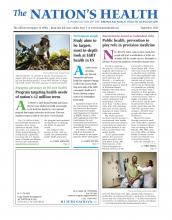Parents with low health literacy are less likely to choose the right strategies to help their kids lose weight, a recent study finds.
Parents with low health literacy choose fewer government-recommended weight loss strategies and fewer weight loss strategies overall for kids, according to a study published in the August issue of Appetite.
Health literacy is measured by a person’s ability to collect, understand and communicate health information and use it to improve her or his well-being.
“Many people are engaging in risky fad diets and young children are growing up in those families where sisters and brothers and parents are talking about dieting and using a variety of ways to lose weight, not all of them healthy ways,” said lead study author Janet Liechty, PhD, MSW, an associate professor at the University of Illinois-Urbana Champaign’s School of Social Work. “We wanted to approach dieting attitudes and strategies as a weight-related health literacy issue, because there’s so much misinformation out there.”
The study looked at more than 470 pairs of parents and their preschool-age children. Researchers assessed parents’ health literacy based on their ability to interpret an ice cream product nutrition label. Parents then were asked to select weight loss strategies that they would use for a child if the child needed to lose weight. The 15 strategies were grouped into three categories: recommended, neutral and unsafe.
Sixteen percent of parents — or one in six parents — had low health literacy skills, the study said.
More than half of all of the parents chose the recommended strategies, which included eating more fruits and vegetables, consuming less fat and exercising more. However, parents with adequate health literacy skills had a higher rate of choosing recommended strategies at 58 percent, compared to a rate of 24 percent among parents with low health literacy skills. Of the parents with low health literacy skills, about 3 percent endorsed the use of unsafe weight loss strategies, such as skipping meals and using laxatives.
Also, parents with low health literacy were less likely to use the Internet as a source of information, possibly because of a lack of Internet access and unfamiliarity with how to effectively search online for health information. Regardless of health literacy skills, parents’ top choice for child weight loss advice was their pediatrician or primary care provider, the study said.
Liechty said child weight loss advice is available to the public but it may be difficult to find in a maze of government health websites aimed at consumers. The public health community could help parents of young children find and use credible Internet sources of information about child nutrition, activity, and healthy weight, she said. Liechty added she would also like to see credible handouts for safe and effective weight management strategies suitable for the whole family that are easy-to-read and distributed in pediatric doctor’s offices, clinics and schools.
“Weight control among children is a sensitive topic, because prior research shows that dieting among overweight and obese children does not work unless it is part of a family-based comprehensive program with adequate behavioral support and medical supervision,” Liechty told The Nation’s Health. “However, websites that encourage a holistic approach to help parents create home food environments that support healthy eating and physical activity for everyone in the family may be helpful.”
For more information, visit www.sciencedirect.com/science/article/pii/S0195666315001506.
- Copyright The Nation’s Health, American Public Health Association









